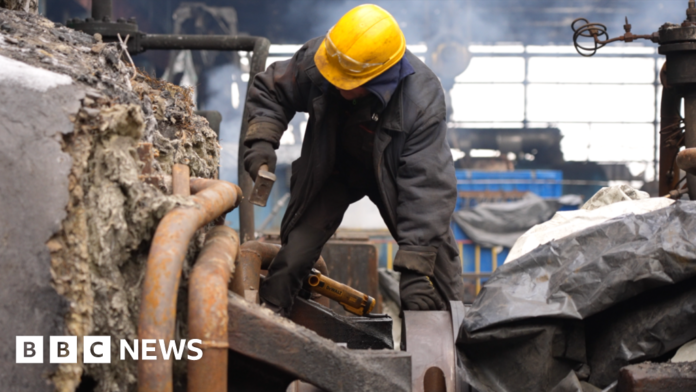 BBC/Joe Phua
BBC/Joe PhuaAmid the monstrous heaps of twisted metal, pools of congealed oil and walls pockmarked by shrapnel, one incongruous detail catches my eye.
Patches of snow. Inside a thermal power station.
With another Ukrainian winter arriving, the vast turbine hall is full of activity. Engineers, dwarfed by the enormous scale of the place, repairing what they can, removing what they can’t, after a recent Russian air strike hit this facility.
For security reasons, we’re not allowed to say where we are or when the visit occurred. Nor can we describe the extent of the damage, or whether the plant is still working.
Russia, we’re told, collects every scrap of information in order to draw up its next target list.
On Thursday, Moscow mounted its second mass attack on Ukraine’s energy infrastructure in less than two weeks.
Ten such attacks this year have placed an enormous burden on the entire energy system.
Before the first of this month’s attacks, on 17 November, Ukraine had already lost 9GW of generation capacity. That’s about half of the power consumed during last winter’s peak heating season.
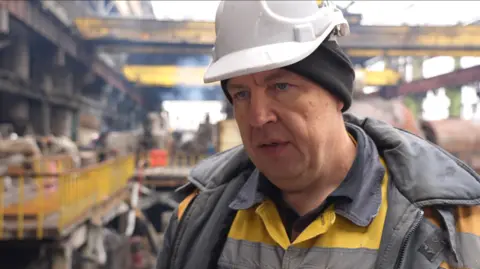 BBC/Joe Phua
BBC/Joe PhuaWe’ve been asked not to say if the plant we visited was among the latest targets on Thursday. But like others across the country, this decades-old facility has suffered multiple drone and missile strikes since Vladimir Putin launched his full-scale invasion in February 2022.
There’s evidence of Russia’s destructive intent everywhere.
In one corner of the turbine hall, under a gaping hole in the roof, workers warm their hands over a makeshift brazier.
Huge sheets of plastic have been draped over the machinery to protect it from the elements.
“The conditions are tough,” says Oleksandr. We’ve agreed not to identify him further.
“We don’t even have time to restore the main equipment, let alone the roof and walls. Everything gets destroyed again from one strike to the next.”
Ukraine’s western allies are trying to help.
On Monday, DTEK, Ukraine’s largest private energy company, said it had received £89m ($113m) from the European Commission and US government to help restore capacity and protect vital equipment from snow, rain and sub-zero temperatures.
But it’s an epic struggle for the exhausted men tasked with keeping Ukraine’s lights on.
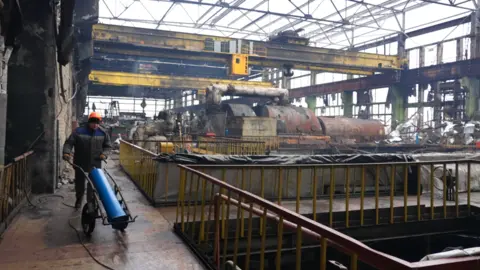 BBC/Joe Phua
BBC/Joe PhuaIn the control room, shielded from the turbine hall by a wall of sandbags, Dmytro is taking a break.
“Some are defending the frontlines on the battlefield,” he tells us. “We have our own energy front to defend.”
But while the engineers from DTEK wrestle with the well-nigh impossible task of keeping one step ahead of Russia’s relentless assault, the rest of the country is doing what it’s been doing since the war began: adapting.
With the full-scale invasion’s third winter arriving, city streets are once again buzzing and roaring to the sound of generators small and large. The street lamps may be off, but shops and restaurants are brightly lit.
Diesel fumes hang heavy in the chill winter air.
In tower blocks, where power cuts put lifts out of action and prevent hot water from reaching the upper floors, residents already used to keeping power banks and flashlights to hand are starting to innovate.
Some have invested in batteries and inverters for their homes, which kick in as soon as the power goes off.
In a twenty-five storey block in Kyiv’s Pozniaky neighbourhood, home to around 700 people, residents have clubbed together to install a larger system in the basement, powerful enough to keep a single lift operating and pump hot water to the upper floors.
For Nataliya Andriyko, who lives on the 19th floor with her husband and pets, it’s a blessing.
“It’s a bizarre feeling,” she tells me as we sit in a kitchen lit by a single battery-operated lamp.
“It’s scary how happy I am just to have these basic needs. That I can take the dog downstairs in the lift rather than on foot in the dark. That I have water in the tap.”
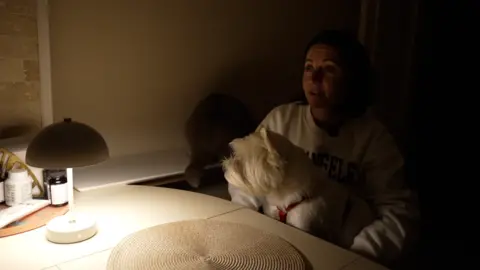 BBC/Joe Phua
BBC/Joe PhuaAfter two hard winters, Nataliya is full of praise for her fellow residents.
“We have a great group of people,” she says. “People who are modern, who understand that something can be invented.”
“Together, we’re strong.”
Dealing with power cuts is a national preoccupation, with people checking their phones to see when the next outage is due and pooling their resources to buy generators and solar panels.
For the makers of the film “Zbory OSBB” (which roughly translates as “Meeting of the Homeowner’s Association”), it’s also fertile ground for comedy.
The film, which premieres early in December, shows a fractious group of residents bickering over the purchase of a generator, as winter approaches.
“When you have more than 10 people and they need to find common ground, it’s always partly funny,” says the movie’s writer and producer, Ivan Melashenko.
Some of the ideas, he said, emerged from the fevered conversations in his own apartment building’s group chat.
“It’s always a nightmare, because everybody has their own opinion and it’s impossible to find a solution.”
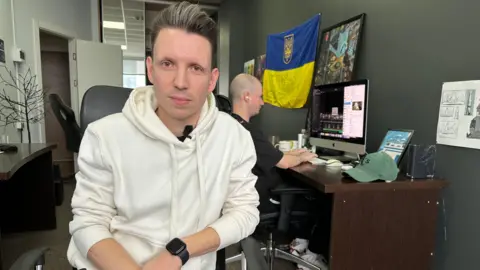 BBC/Joe Phua
BBC/Joe PhuaThe premise of the movie – how to stay warm when Ukraine’s bitter winter sets in – is hardly the stuff of comedy.
“But when people are starting to have these clashes and conflicts, of course we have all the jokes you can imagine,” Ivan says.
He says audiences aren’t looking for escapism – the war is the stark, inescapable backdrop – but they are looking for positive news.
“It’s impossible to live in such dramatic and stressful conditions for three years without any positive emotions,” he says.
“People need this.”
Additional reporting by Hanna Chornous
